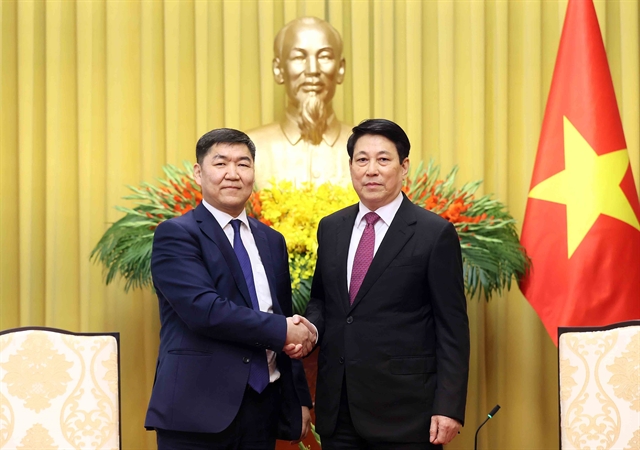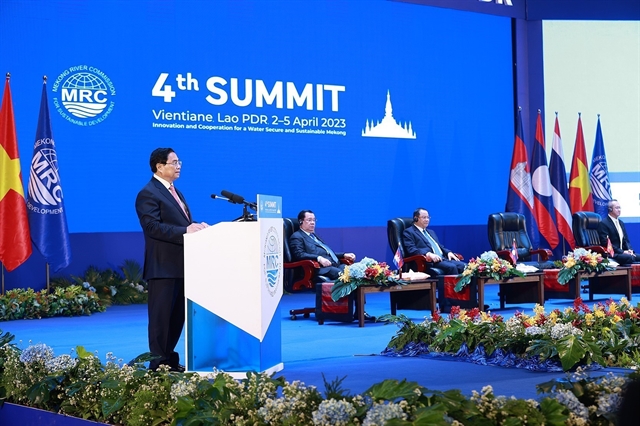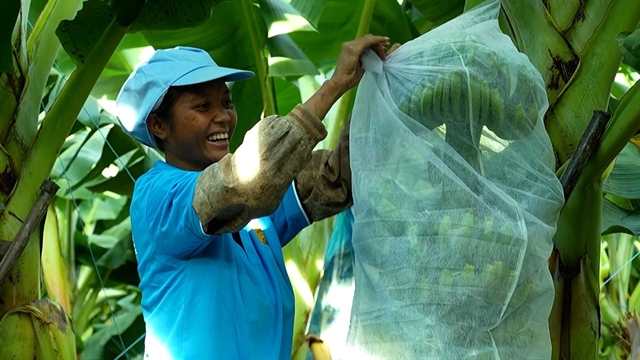 Politics & Law
Politics & Law


|
| Prime Minister Phạm Minh Chính addresses the fourth MRC Summit in Vientiane on Wednesday. – VNA/VNS Photo |
VIENTIANE – Việt Nam always attaches importance to the Mekong River Commission (MRC) role and is committed to working closely with member countries to implement MRC's strategies and action plans successfully, said Prime Minister Phạm Minh Chính at the fourth MRC Summit in Vientiane on Wednesday.
During the fourth MRC Summit in Vientiane, leaders of Mekong River countries and their partners discussed challenges and solutions to develop the river basin sustainably.
PM Chính said it aims to build the Mekong River basin that is economically prosperous, socially equitable, environmentally healthy and resilient to climate change for peace, stability, development and common prosperity of the ASEAN Community.
During the fourth MRC Summit in Vientiane, leaders of Mekong River countries and their partners discussed challenges and solutions to develop the river basin sustainably.
MRC members continued to affirm political commitment to enhancing the effective implementation of the 1995 Mekong Agreement and the functions of the MRC.
Addressing the summit themed ‘Innovation and Cooperation for a Water Secure and Sustainable Mekong’, PM Chính highly appreciated the indispensable role of the International Mekong River Commission and expressed thankfulness for partners in the region who always create favourable conditions and support Việt Nam and other regional countries to protect the Mekong River.
The Mekong River basin is facing great challenges due to the effects of climate change, the pressure of economic development requirements and the rapid increase in water use.
Mekong water resources are degrading in both quantity and quality, directly affecting efforts to ensure water and food security for all countries, especially more than 60 million people in the basin, Chính said.
“As a country located downstream of the Mekong River, Việt Nam is feeling these heavy impacts most clearly,” he said.
“The flow from the upper Mekong River to the downstream and the Mekong Delta has been severely reduced. The delta often faces severe droughts. Saline intrusion tends to appear one to one and a half months earlier with a greater scale and intensity than before.”
In 2020, the sediment level in the Mekong Delta decreased to only one-third of the amount 15 years ago.
He said this directly affects the livelihoods of more than 20 million people in the Mekong Delta and efforts to ensure water and food security for all countries in the basin.
Chính suggested the MRC continue to affirm its strong commitment to abide by and effectively implement the 1995 Mekong Agreement strictly.
He also proposed the commission follow the set of regulations on water use, especially fundamental principles on sovereignty equality and territorial integrity, fair and rational use of water resources, rational maintenance of flows on the mainstream, and prevention and limitation of negative impacts on downstream water.
All policies and actions taken by MRC and its member countries need to be people-centred, ensure sustainable residents’ livelihoods, and protect legitimate rights and interests of people living in the basin, he said.
Countries need to promote green economic development and circular economies, support regional plans for research and development of renewable energy sources such as wind and solar energy, and connect and upgrade regional networks' electricity grids, he said.
The Vietnamese Government leader called on partners to strengthen cooperation and support for the MRC in financial resources, knowledge, experience and modern technology.
He proposed the MRC's activities need to be more closely linked with the implementation of the ASEAN Community Vision, the United Nations' Sustainable Development Goals, international commitments on climate change as well as the Decade for Action “Water for Sustainable Development” for the 2018-22 period and other commitments at the recent United Nations Water Conference.
At the end of the summit, representatives of Mekong River countries adopted the Joint Statement – Vientiane Declaration.
The declaration affirms the highest political commitment of the four member countries, the purposes and principles of cooperation for the sustainable development of the river basin
It also identifies the focus of MRC cooperation in the coming time. – VNS




